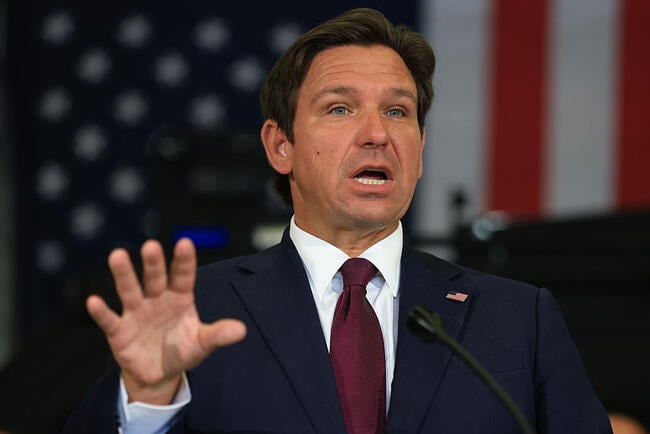You have /5 articles left.
Sign up for a free account or log in.

Joe Raedle/Getty Images
At an event that began with a litany of complaints about “woke ideology” in higher education, Florida governor Ron DeSantis announced Thursday morning that six state university systems are forming a new accreditor.
Speaking at Florida Atlantic University, DeSantis bemoaned liberal and unproductive faculty members and what he views as spineless administrators unwilling to crack down on disruptive student behavior before ultimately turning to what he sees as an “accreditation cartel,” which he cast as undercutting efforts at reform, calling out past clashes with accreditors in response to actions by state universities.
“Who are these accreditors? Did you elect these accreditors to anything?” DeSantis asked.
After a roughly 30-minute broadside against what he saw as the failings of higher education generally and the accreditation system in particular, the Republican governor announced that Florida was moving forward with a new accreditor, to be named the Commission for Public Higher Education.
Public systems joining the State University System of Florida as partners are the University System of Georgia, University of North Carolina system, University of South Carolina, University of Tennessee system and the Texas A&M University system. All those systems are in states that voted for Donald Trump in 2024.
The states face a lengthy path to federal recognition for the new accreditor, though the Trump administration has said that it wants to make that process faster and easier.
DeSantis emphasized the importance of moving quickly; he said he wanted to see the new accreditor approved during the Trump administration out of concern that the next president could potentially slow or undermine efforts to launch the new accrediting body.
Outcomes or Ideology?
While DeSantis spoke at length about his opposition to “woke ideology,” other partners emphasized outcomes.
Peter Hans, president of the UNC system, told Inside Higher Ed he began to have conversations with peers after the state passed a law in 2023 that requires colleges to change accreditors. Hans noted “long-standing frustrations with the accreditation process from the campus level in terms of the time and the money that’s dedicated to the current model providing very little return and often a lot of unnecessary hoops to jump through for public institutions.”
The idea to launch a new accreditor coalesced through conversations with peers who had similar concerns and wanted to explore what forming an alternative accreditor might look like. From there, the partnership with Florida, first reported by Inside Higher Ed, and others emerged.
“This [accreditor] would be for public universities, by public universities, and at the end of the day, completely focused on academic quality and student outcomes,” Hans said, adding that the effort aims to streamline costs and “reduce the burden on smaller, less resourced universities.”
Other system leaders also largely avoided politics in remarks included in a news release from the State University System of Florida. They emphasized efficiency, cost savings and student outcomes.
But DeSantis focused on politics as he heralded the state’s efforts to root out so-called woke bias in public universities.
“When we’ve said, [no diversity, equity and inclusion initiatives] the accreditor was telling our universities, ‘Oh, no. You’re not going to get accredited unless you do DEI.’ Who the heck are they to say what our universities have to do? They’re telling them they can’t follow state law … What we’ve seen develop is an accreditation cartel,” DeSantis said.
(The Southern Association of Colleges and Schools Commission on Colleges, which accredits all of Florida’s public institutions, does not have DEI in its standards. When asked about this fact, DeSantis suggested that it was not true. However, SACS has never had DEI provisions.)
Wade Maki, Faculty Assembly chair and a philosophy professor at UNC Greensboro, told Inside Higher Ed that the effort to launch a new accreditor has “great potential” to cut through the “bureaucracy in some of our accreditation requirements.” But he added that it was unfortunate that DeSantis took such a sharp political tone in Thursday’s announcement.
Still, he’s optimistic and expressed confidence in Hans and system leadership as this effort develops.
“We have been raising concerns about an association with Florida, given the politicized actions we've seen there, and other things around ensuring the quality of our degrees and the reputation of our institutions. What we've gotten back from our system has been fairly reassuring,” Maki said.
Both he and Hans noted that conversations would continue in the coming months.
Some outside experts also noted concerns. Judith Eaton, former president of the Council for Higher Education Accreditation, wrote by email that “one of the great strengths of current accreditation organizations is their private, nonprofit status,” which has “enabled them to operate with some, admittedly not total, independence from both government and political influence.”
A key question for Eaton is whether the new accreditor will be under public or private control.
“If public, this would appear to be a mechanism for additional state control, expanding the already growing authority that states are exercising over higher education institutions, perhaps furthering the erosion of autonomy and academic freedom that we are currently witnessing,” Eaton wrote.
Past Skirmishes
The announcement comes after Florida and North Carolina both clashed with SACS in recent years.
In 2022, Florida’s Legislature passed a law requiring state institutions to switch accreditors regularly, which came a year after SACS raised concerns about an attempt by the University of Florida to bar faculty from testifying against the state in a legal case challenging voting-rights restrictions. SACS also probed a potential conflict of interest at Florida State University where then–state education commissioner and Florida Board of Governors member Richard Corcoran emerged as a candidate for FSU’s presidency. (Corcoran now leads the public New College of Florida.)
Then, in early 2023, SACS raised questions about shared governance concerns at the University of North Carolina at Chapel Hill. Later that year, North Carolina lawmakers slipped a provision into a budget bill, with no debate, that required state institutions to change accreditors.
Florida also filed a federal lawsuit in 2023 challenging the constitutionality of accreditation, alleging organizations such as SACS wield “near limitless power over state institutions.” However, a federal judge rejected those claims and dismissed the lawsuit in fall 2024.
For DeSantis, the launch of a new accreditor comes after a decade of complaints about the current system. In 2015, when DeSantis was in Congress, he co-sponsored legislation that would have allowed states “to experiment with different approaches to accreditation,” he said in a statement at the time. That legislation was unsuccessful, as was a second attempt in 2017.
Having failed to beat accreditors in the courts or via legislation, DeSantis is now poised to join them as Florida and other states chart their own path forward on accountability for colleges.




